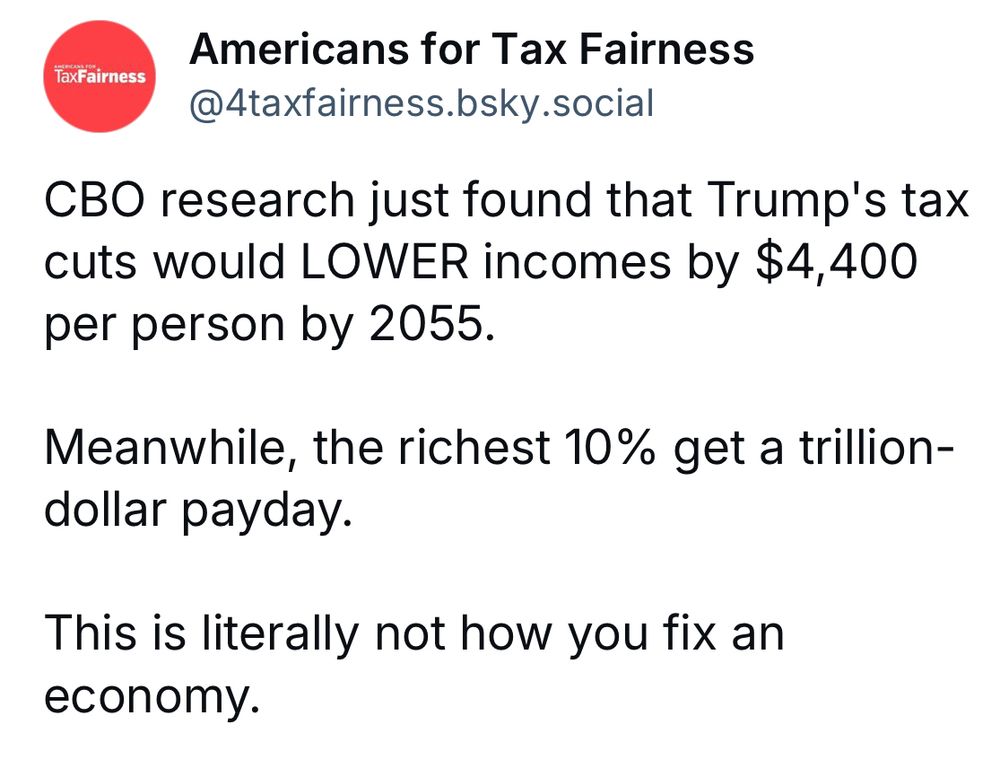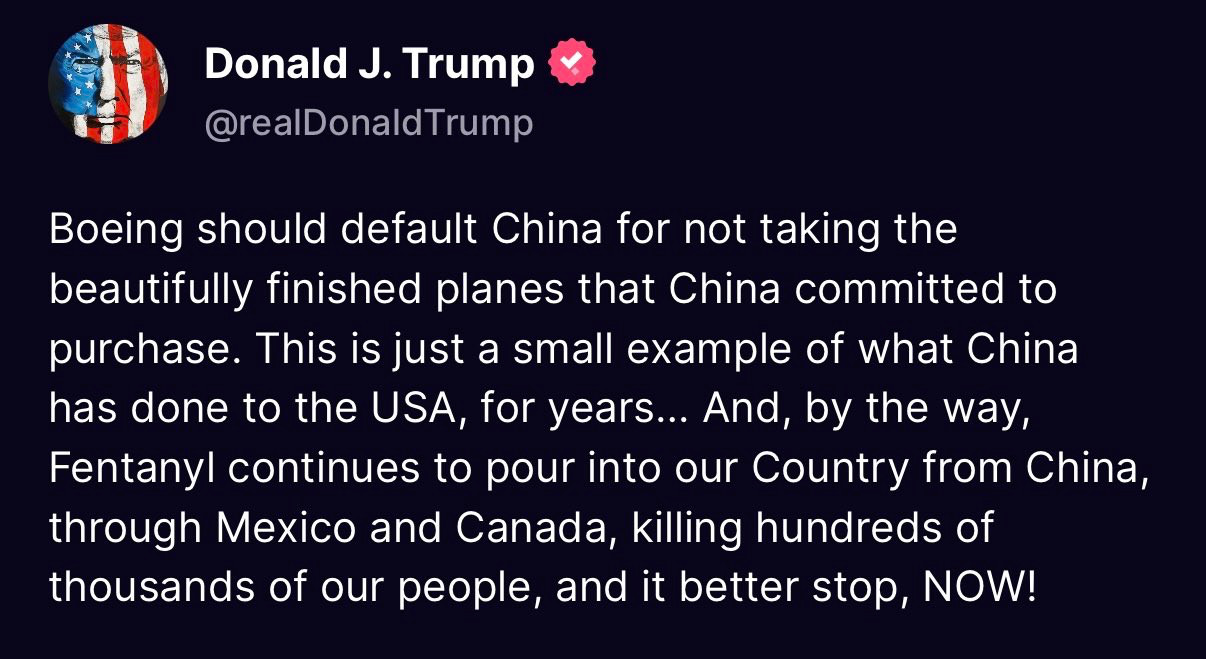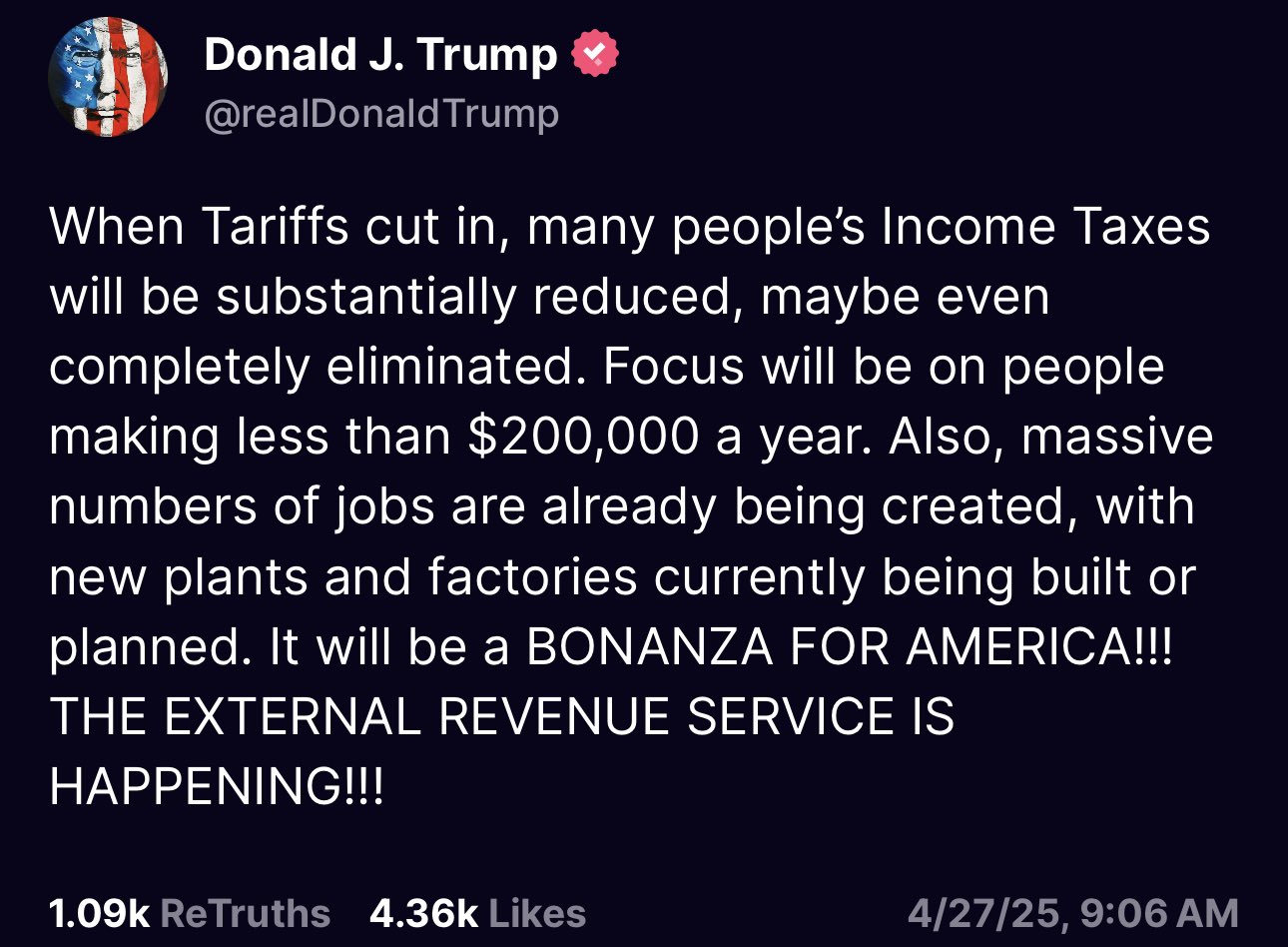https://time.com/7280114/donald-trump-2025-interview-transcript/
Q: We’d love to come back to immigration but maybe start with the economy. Obviously an issue you campaigned on as well. You promised that you would immediately bring down prices and usher in a golden age of America. The prices of gas and eggs have gone down, but the cost of other things remain—
Trump: The prices of groceries have gone down. The only price that hasn't gone down is the price of energy. The cost of energy, I'm sorry, well, energy has gone down, excuse me. Let me change that—is the interest rates. And interest rates have essentially stayed the same. But almost every other thing, I mean, you take a look at what's going on, and this is, we're taking in billions of dollars of tariffs, by the way. And just to go back to the past, I took in hundreds of billions of dollars of tariffs from China, and then when COVID came, I couldn't institute the full program, but I took in hundreds of billions, and we had no inflation.
But let’s focus on what is happening right now because—
We took in billions of dollars, we had no inflation. Now, if you take a look, the price of groceries are down. The price of energy is down.
Inflation remains pretty much the same. And the IMF is saying it’s going to go up.
No, Eric, you can't say what they think, because so far what I thought is right. I've been right about—
401ks are down. The Atlanta Fed says our economy is contracting -2.2% during quarter one.
Well, they may have said that, but so far, they've been, I mean, I've been right. If you look at all of the years that I've been doing this, I've been right on things. You're gonna—you're gonna have the wealthiest country we've ever had, and you're gonna have an explosion upward in the not-too-distant future. You know, I've been here now for three months, and I inherited eggs, I inherited groceries, I inherited energy. It was all going through the roof. And we had the highest inflation we've ever had as a country, or very close to it. And I believe it was the highest ever. Somebody said it's the highest in only 48 years. That's a lot, too, but I believe we had the highest inflation we've ever had. I've been here now for three months. And three months, we are taking in billions and billions of dollars from other countries that we never took in before. And that's just the start.
Well let’s talk about the tariffs. You want companies to build and make goods here in America.
Not in all cases. There are some products I really don't want to make here.
Like t-shirts?
I can’t–I can give you a list because I actually have a list, but if you want, I could give it to you.
Well, I mean, the question is, how can CEOs make long-term plans and investments if our tariff policy can change from day to day and still remains so uncertain?
How can they make long-term investments? I'll turn it around. How can they make long-term investments if our country is losing $2 trillion a year on trade?
Will you consider giving exemptions—
No wait, just so you understand. How can we sustain and how is it sustainable that our country lost almost $2 trillion on trade in Biden years, in this last year. That's not—when you talk about a company. I had the head of Walmart yesterday, right in that seat. I had the head of Walmart. I had the head of Home Depot and the head of Target in my office. And I'll tell you what they think, they think what I'm doing is exactly right.
Well, the CEOs of small businesses are saying they may not be able to last another two months with the current regime in place. Will you consider giving small businesses an exemption similar to what you've given to Big Tech?
I’d have to look at the individual business.
Would you consider it?
Our country is going to be very rich in not a long period of time. I've been doing this for three months, and if you look at the kind of numbers that we're taking in and the jobs, and if you look at, more importantly, the companies, the chip companies, the car companies, the Apple. $500 billion. Apple is investing $500 billion in building plants. They never invested in this country.
Small businesses are worried that you’re treating the Apples of the world better than you’re treating them.
No, I’m treating small businesses—small businesses will be a bigger beneficiary of what I'm doing than than the large businesses. But everybody's going to benefit.
If we still have high tariffs, whether it's 20% or 30% or 50%, on foreign imports a year from now, will you consider that a victory?
Total victory.
Why so?
Because the country will be making a fortune. Look, that's what China did to us. They charge us 100%. If you look at India—India charges 100-150%. If you look at Brazil, if you look at many, many countries, they charge—that's how they survive. That's how they got rich. Now, zero would be easy. Oh, zero would be easy, but zero, you wouldn't have any companies coming in. They're coming in because they don't want to pay the tariffs. Remember this, there are no tariffs, if they make their product here. There are no tariffs, if they make their product here. There are no tariffs. This is a tremendous success. You just don't know it yet, but this is a tremendous success what’s happening. We're taking in billions and billions of dollars, money that we never took in before. We're also, very importantly, because of that, because of the money we're taking in, those companies are going to come back and they're going to make their product here. They're going to go back into North Carolina and start making furniture again. They've already started. In Mexico, many car plants that were under construction have stopped. They're all coming into this country. We're gonna, you're gonna see car plants going at a level that you've never seen before.
Your trade adviser–
I'm also—chips. Look at Jensen.
Nvidia.
He's gonna spend $500 billion. Look at Mr. Wei from Taiwan.
Do you trust them when they say that? These businessmen who say, Oh, I'm gonna spend $500 billion.
Oh yeah. Well, I’ll tell you why I trust them. First of all, I think they’re trustworthy people. But more importantly, they have no choice, because they won't be able to pay the tariffs if they don't do it. The tariffs are bringing in the business. Remember, with all the, you know, questions you're asking about tariffs, there are no tariffs when you make your product here.
Sure, no, I understand, Mr. President—
Zero.
Your trade adviser, Peter Navarro, says 90 deals in 90 days is possible. We're now 13 days into the point from when you lifted the reciprocal, the discounted reciprocal tariffs. There's zero deals so far. Why is that?
No, there’s many deals.
When are they going to be announced?
You have to understand, I'm dealing with all the companies, very friendly countries. We're meeting with China. We're doing fine with everybody. But ultimately, I've made all the deals.
Not one has been announced yet. When are you going to announce them?
I’ve made 200 deals.
You’ve made 200 deals?
100%.
Can you share with whom?
Because the deal is a deal that I choose. View it differently: We are a department store, and we set the price. I meet with the companies, and then I set a fair price, what I consider to be a fair price, and they can pay it, or they don't have to pay it. They don't have to do business with the United States, but I set a tariff on countries. Some have been horrible to us. Some have been okay. Nobody's been great. Nobody's been great. Everybody took advantage of us. What I'm doing is I will, at a certain point in the not too distant future, I will set a fair price of tariffs for different countries. These are countries—some of them have made hundreds of billions of dollars, and some of them have made just a lot of money. Very few of them have made nothing because the United States was being ripped off by every, almost every country in the world, in the entire world. So I will set a price, and when I set the price, and I will set it fairly according to the statistics, and according to everything else. For instance, do they have the VAT system in play? Do they charge us tariffs? How much are they charging us? How much have they been charging us? Many, many different factors, right. How are we being treated by that country? And then I will set a tariff. Are we paying for their military? You know, as an example, we have Korea. We pay billions of dollars for the military. Japan, billions for those and others. But that, I'm going to keep us a separate item, the paying of the military. Germany, we have 50,000 soldiers—
I’m just curious, why don’t you announce these deals that you’ve solidified?
I would say, over the next three to four weeks, and we're finished, by the way.
You’re finished?
We’ll be finished.
Oh, you will be finished in three to four weeks.
I’ll be finished. Now, some countries may come back and ask for an adjustment, and I'll consider that, but I'll basically be, with great knowledge, setting—ready? We're a department store, a giant department store, the biggest department store in history. Everybody wants to come in and take from us. They're going to come in and they're going to pay a price for taking our treasure, for taking our jobs, for doing all of these things. But what I'm doing with the tariffs is people are coming in, and they're building at levels you've never seen before. We have $7 trillion of new plants, factories and other things, investment coming into the United States. And if you look back at past presidents, nobody was anywhere near that. And this is in three months.
--------
Deranged.



